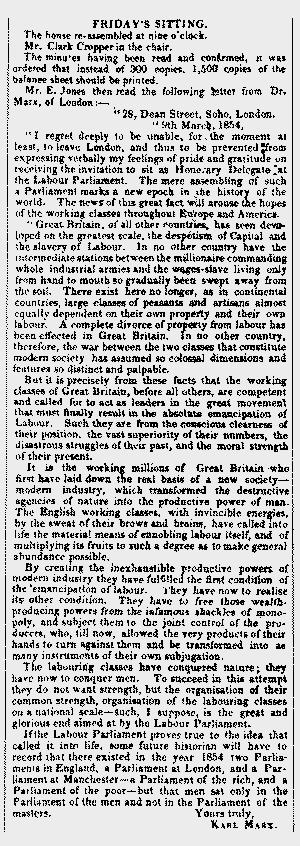
Letter to the Labour Parliament[59]
28, Dean Street, Soho, London
9th March, 1854
 I regret deeply to be unable, for the moment at least, to leave London, and thus to be prevented from expressing verbally my feelings of pride and gratitude on receiving the invitation to sit as Honorary Delegate at the Labour Parliament[60]. The mere assembling of such a Parliament marks a new epoch in the history of the world. The news of this great fact will arouse ŌĆśthe hopes of the working-classes throughout Europe and America.
I regret deeply to be unable, for the moment at least, to leave London, and thus to be prevented from expressing verbally my feelings of pride and gratitude on receiving the invitation to sit as Honorary Delegate at the Labour Parliament[60]. The mere assembling of such a Parliament marks a new epoch in the history of the world. The news of this great fact will arouse ŌĆśthe hopes of the working-classes throughout Europe and America.
Great Britain, of all other countries, has been developed on the greatest scale, the despotism of Capital and the slavery of Labour. In no other country have the intermediate stations between the millionaire commanding whole industrial armies and the wages-slave living only from hand to mouth so gradually been swept away from the soil. There exist here no longer, as in continental countries, large classes of peasants and artisan., almost equally dependent on their own property and their own labour. A complete divorce of property from labour has been effected in Great Britain. In no other country, therefore, the war between the two classes that constitute modern society has assumed so colossal dimensions and features so distinct and palpable.
But it is precisely from these facts that the working-classes of Great Britain, before all others, are competent and called for to act as leaders in the great movement that must finally result in the absolute emancipation of Labour. Such they are from the conscious clearness of their position, the vast superiority of their numbers, the disastrous struggles of their past, and the moral strength of their present.
It is the working millions of Great Britain who first have laid down ŌĆö the real basis of a new societyŌĆömodern industry, which transformed the destructive agencies of nature into the, productive power of man. The English working-classes, with. invincible energies, by the sweat of their brows and brains, have called into life the material means of ennobling labour itself, and of multiplying its fruits to such a degree as to make general abundance possible.
By creating the inexhaustible productive powers of modern industry they have fulfilled the first condition of the emancipation of Labour. They have now to realise its other condition. They have to free those wealth-producing powers from the infamous shackles of monopoly, and subject them to the joint control of the producers, who, till now, allowed the very products of their hands to turn against them and be transformed into as many ,instruments of their own subjugation.
The labouring classes have conquered nature; they have now to conquer man. To succeed in this attempt they do not want strength, but the organisation of their common strength, organisation of the labouring classes on a national scaleŌĆösuch, I suppose, is the great and glorious end aimed at by the Labour Parliament,
If the Labour Parliament proves true to the idea that called it into life, some future historian will have to record that there existed in the year 1854 two Parliaments in England, a Parliament at London, and a Parliament at ManchesterŌĆöa Parliament of the rich, and a Parliament of the poor ŌĆö but that men sat only in the Parliament of the men and not in the Parliament of the masters.
Yours truly,
Karl Marx
Written: on March 9, 1854;
First Published: in the People's Paper. No. 98, March 18, 1854;
|
Notes
[59]
Marx's letter to the Labour Parliament was read out by Jones at the evening sitting on March 10. Jones also declared that he was expecting Marx to come to Manchester the following week, obviously basing himself on Marx's promise given in a private letter to Jones (which has not been found).
[60]
On Marx's election as an honorary delegate to the Labour Parliament, see Note 51Ōåō.
[51] In 1853, with the growth of a massive strike movement of the English proletariat, a group of Chartists headed by Ernest Jones proposed to create a broad workers' organisation, The Mass Movement, which was to unite trade unions and unorganised workers with the primary aim of coordinating strikes in the various districts of the country. The organisation was to be headed by a regularly convened Labour Parliament consisting of delegates . elected at meetings of both unorganised workers and of the trade unions associated with The Mass Movement. The Labour Parliament assembled in Manchester on March 6, 1854 and was in session till March 18, 1854. It discussed and adopted the programme of The Mass Movement and set up an Executive of five members. Marx, elected honorary delegate to the Parliament, sent a letter to it.
The attempt to found The Mass Movement failed, because the majority of the trade union leaders did not approve of associating the trade unions with the political struggle and did not support the idea of creating a single mass workers' organisation. By the summer of 1854 the strike movement had abated and this also cut short the participation of broad masses of workers in the movement. After March 1854 the Labour Parliament never met again.
Source: Marx and Engels Collected Works, Volume 13 (pp.57-60), Progress Publishers, Moscow 1980
MarxEngles.public-archive.net #ME1873en.html
|